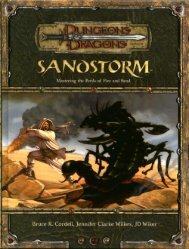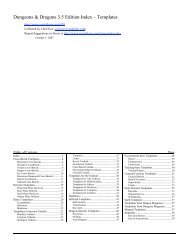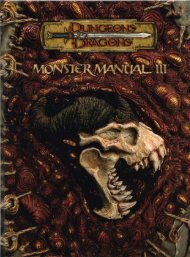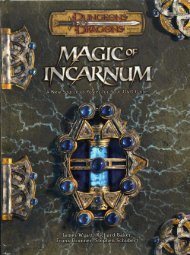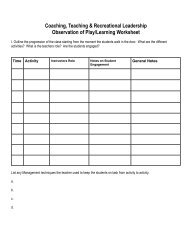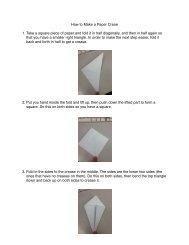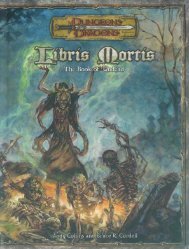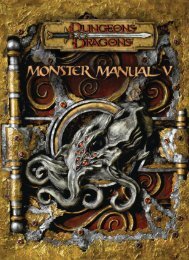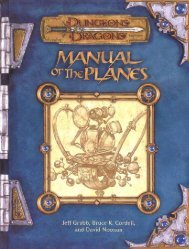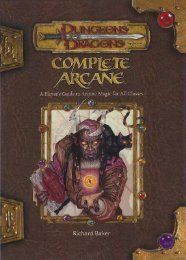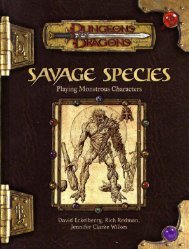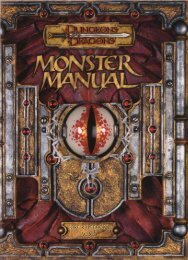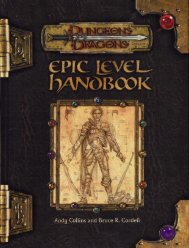CHAPTER 1ELVES12consider magic part <strong>of</strong> their daily lives and use it in the form<strong>of</strong> magic items. To an elf’s way <strong>of</strong> thinking, there is almostnothing that cannot be done wholly or partially by magic.Because <strong>of</strong> their highly individualistic nature, elvesfrequently develop new spells and create new magic items.Their aptitude for wielding magic is legendary, though notall elves choose arcane magic as their life’s work.Elf communities are sparked with magic in many ways.Continual flame provides light at night in numerous ways,and levitate gives access to tree houses for those who donot wish to encourage visitors by keeping ladders nearby.Parents keep track <strong>of</strong> their children via clairaudience/clairvoyance,and lovers communicate via message and sending. Ifmagic can make life easier or richer in any way, the elveshave thought <strong>of</strong> it.Elves employ arcane magic in all its forms, though wizardryis the most common path to magical mastery. Sorcerersare considered talented but amateurish and perhaps a bitlazy because their selection <strong>of</strong> spells is so limited. Manyelf sorcerers specialize in combat or elemental magic, andquite a few combine arcane magic with the pursuit <strong>of</strong> somenonmagical pr<strong>of</strong>ession, such as fighter, rogue, or ranger. Suchmulticlass elves occasionally use spells to enhance their othertalents on the sly, never admitting that they know magic atall. Adventuring elf sorcerers <strong>of</strong>ten hire themselves out tosurface dwellers as mercenaries or master crafters.Most elf arcane spellcasters are wizards. Despite theinnately chaotic nature <strong>of</strong> most elves, the study and disciplinerequired to employ wizardry appeal to their sense <strong>of</strong> nearlimitlesstime and deep personal focus. Those who choosethis path apply themselves zealously to learning the secrets<strong>of</strong> the art. Since they have much more time to perfect theirskills than humans do, elves tend to achieve a high degree <strong>of</strong>pr<strong>of</strong>iciency with wizardry even if they become distracted byother business for a time. Colleges <strong>of</strong> magic exist in almostevery elf city <strong>of</strong> any size, and most elf wizards avail themselves<strong>of</strong> the resources available at such schools. Many, however,come to find such institutions limiting, so they search outsolitary wizards with whom to expand their training andeventually take up research on their own.Elf spellcasters display no particular preference for anyone school <strong>of</strong> magic, but practitioners <strong>of</strong> necromancy aresomewhat rare because elves tend toward good alignments.Enchantment comes almost naturally to elves, many <strong>of</strong> whomcan beguile other creatures with no magic at all, simply byvirtue <strong>of</strong> their personal appeal and pleasant nature. Divinersand conjurers are greatly valued in elf communities for theirabilities to warn <strong>of</strong> coming danger and to create useful itemsand effects, respectively. Evokers are treated with somewhatless awe by elves than by other races because elves are accustomedto magical effects and tend to value utility and beautymore than destructive power.Many elf wizards build themselves towers or strongholdsin which to conduct their research. Such structures are <strong>of</strong>tenplaced apart from the community to avoid endangering otherswith experiments gone awry.LOVEElves idealize the concept <strong>of</strong> romantic love as much ashumans do, if not more so. Songs, stories, and poems arededicated to this powerful emotion in every generation.Nevertheless, to elves, love is more frightening than it is tohumans because loving another enough to share one’s wholelife means giving up a measure <strong>of</strong> the independence thatelves so value. Thus, although the concept <strong>of</strong> love fascinatesthe ever-curious elves, most are in no particular hurry t<strong>of</strong>ind and embrace it for themselves. Courtships between elfcouples are generally long, <strong>of</strong>ten lasting for decades beforethe partners commit to marriage.Paradoxically, elves <strong>of</strong>ten find it easier to commit tolong-term romantic relationships with humans than withother elves. The fifty years or so that such a union mightlast before the death <strong>of</strong> the human partner is nothing morethan a pleasant interlude for the elf—no more than the timeit might take to produce an artistic masterpiece or learn anew craft. Remaining focused on a single partner for thatamount <strong>of</strong> time is relatively easy for an elf and allows hima greater understanding <strong>of</strong> the lives and thought processes<strong>of</strong> shorter-lived races.A marriage between elves, however, is a centuries-longcommitment that is never undertaken lightly. Light flirtationsand even long-term dalliances between elves are morecommon than actual marriages. Children produced fromsuch informal arrangements bear no stigma because newlife is welcome in almost any elf community, whatever therelationship that produced it.Though elves reach physical maturity at 25, marriagesalmost never occur at such a young age. In practice, elves lessthan 100 years old are considered too young for marriage andare strongly discouraged from considering such a permanentarrangement until they’ve had a few more decades <strong>of</strong> experienceto understand themselves. No parental or clan consentis required for courtships; an adult elf is free to associatewith anyone who accepts his attentions—even someone <strong>of</strong>another race. Elves almost never have arranged marriagesbecause such a concept is diametrically opposed to theirideal <strong>of</strong> individual freedom.An elven marriage ceremony can take many forms. Thoughit is <strong>of</strong>ten a ritual celebrated before the entire community, itcan consist simply <strong>of</strong> two elves speaking the words that bindthem forever with no witnesses except the trees and the grass.Most elven weddings are <strong>of</strong>ficiated by a priest <strong>of</strong> whateverdeity the couple deems appropriate (most <strong>of</strong>ten Hanali Celanil,but sometimes Corellon Larethian). The two elves write andspeak their own vows, and the priest uses their own wordsto seal the union. Thus, an exchange <strong>of</strong> vows amounts to anexchange <strong>of</strong> life essence that forever bonds one to the other.Dowries are not usually exchanged unless the marriage is<strong>of</strong> considerable political import, though gifts to the newlywedded couple from the community are common.Though elves rarely fall out <strong>of</strong> love with one another andalmost never remarry after the death <strong>of</strong> a spouse, they <strong>of</strong>ten
do spend time away from one another as a means <strong>of</strong> refreshingthe relationship. Such “vacations” from one another keep amarriage fresh and vital by allowing each partner to growindependently <strong>of</strong> the other.Outsiders <strong>of</strong>ten mistakenly believe that elves have littlelove for family, friends, and community because they mayleave home for years at a time to follow their own desires.However, while elves are undeniably self-centered, theyusually harbor deep-seated affection for their families andfriends. The extent <strong>of</strong> that affection can be seen in theirwillingness to let go and trust that their loved ones willreturn to share more time with them. Indeed, when an elfwho has been absent from his community for an extendedperiod decides to return home, little can stand in his way,and the joy <strong>of</strong> his loved ones upon his return is boundlessindeed. Celebrations extending for weeks <strong>of</strong>ten surroundthe return <strong>of</strong> a long-absent member <strong>of</strong> the community,who doubtless has many tales to tell <strong>of</strong> his travels. Suchstories serve to enrich the understanding and the lore <strong>of</strong>the entire community.ReproductionThough an elf reaches mental and physical maturity at theage <strong>of</strong> 25, very few elves become parents until much later inlife. Elves rarely feel that they’re ready to settle down andbegin families before they’re at least 100 years old, and moststop having children soon after reaching the age <strong>of</strong> 200. Elfchildren are not as numerous as one might expect, given thelength <strong>of</strong> an elf’s child-rearing years, because elves are lessfertile than humans and other shorter-lived races. A typicalhuman couple might have one to four children over thecourse <strong>of</strong> a decade, but an elf couple might take fifty yearsto have the same number <strong>of</strong> children.Elves have a gestation period <strong>of</strong> approximately nine months,just as humans and other similarly sized creatures do. Once achild is born, his or her parents usually raise the youngster forthe first few years, and then foster him or her out to a succession<strong>of</strong> older relatives until he or she reaches maturity. Thispractice provides training for the child in a variety <strong>of</strong> areasand allows the parents to return to the pursuit <strong>of</strong> their owninterests. It also encourages young elves to develop theirown sense <strong>of</strong> self and a degree <strong>of</strong> personal independence.ELVES AT WARElves consider war a last resort for resolving disputes. Thoughthey are by no means cowardly, they know that they canexpect to live for hundreds <strong>of</strong> years, and they are loath to risktheir lives over petty issues. Since virtually all elves are inaccord on this point, they almost never war against their ownkind, except for periodic skirmishing between surface elvesand drow. The same sentiment prevents elves from declaringwar on other beings unless the situation is dire and the fate<strong>of</strong> the world hangs in the balance.Not all sentient beings share the elves’ “live and let live”credo. Tribes <strong>of</strong> orcs, renegade dwarves, and even imperialistichuman kingdoms have long coveted elf lands and resources,and many have tried to seize the holdings <strong>of</strong> their more pacifisticneighbors by force <strong>of</strong> arms. Thus, even the peace-lovingelves must have adequate defenses for their settlements.All elves learn the use <strong>of</strong> the bow and the sword while stillyoung so that they can help to defend their ancestral landsfrom invaders <strong>of</strong> any kind. Such training commences forboth males and females at about 15 years <strong>of</strong> age.Because <strong>of</strong> their general unwillingness to risk their livesunnecessarily, the elves’ first line <strong>of</strong> defense is usually thelongbow, allowing them to slay their enemies from a distance.(This tactic is especially effective in circumstances when theycan use their low-light vision to decimate foes before theenemy can even see them.) Elven culture does not demeanthe bravery <strong>of</strong> a warrior who drops his enemies from afar.After all, allowing a larger and stronger foe to engage in meleecombat is folly, not courage. Foes that manage to threaten anelf at melee range are usually met with a flashing longswordor rapier.Most elf settlements augment their defenses with arcanemagic. Alarm spells and other defensive dweomers placedaround the perimeter <strong>of</strong> elf territory warn <strong>of</strong> the approach <strong>of</strong>intruders, and elf wizards regularly employ scrying to ensureCHAPTER 1ELVESpqqqqqqqqqqqqqqqqqqqqrsELVES AND ADULTHOODTable 6–4 <strong>of</strong> the Player’s Handbook suggests that elves don’t Humans finish their “filling out” and full adult growth byreach their full physical growth until an age <strong>of</strong> 110, at a minimum.That’s not entirely accurate. The random starting age for full height and weight before age 25. After that, elves remainabout age 20, but elves take a little longer, rarely reaching theirelves is simply the age at which many elf adventurers feel ready virtually timeless, decade after decade. Not even another elfto leave their forests and roam the world outside for a time. More can tell at a glance whether an elf is 25, 50, or 100 years <strong>of</strong>than a few elves have commenced their adventuring careers at age. A few minutes’ conversation quickly dispels the mystery,much younger ages.<strong>of</strong> course; elves gain experience, grace, emotional maturity,Elf children grow almost as swiftly as human children to age patience, and wisdom throughout these ageless decades. Even15 or so; a 10-year-old elf boy and a 10-year-old human boy are so, some elves are remarkably poised for their age, and somenearly the same size and have similar mental and emotional elven romances tell the tale <strong>of</strong> a grieving elf <strong>of</strong> 150 years <strong>of</strong> agematurity. The elf will be shorter and slighter than his human discovering life and joy again in new lover <strong>of</strong> only 25 or 30 whoplaymate. He is also quite likely to be more patient, observant, carries himself or herself like an elf <strong>of</strong> 100.and self-sufficient, simply due to the influence <strong>of</strong> growing up inan elf household.pqqqqqqqqqqqqqqqqqqqqrs13
- Page 2: C R E D I T SD E S I G NSKIP WILLIA
- Page 7 and 8: no elf could predict which memory w
- Page 9 and 10: premium. Thus, each individual can
- Page 11: The elves have raised one form of e
- Page 15 and 16: espects during this time, and those
- Page 17 and 18: Stores Master: Charged with keeping
- Page 19 and 20: would be the birthright of any full
- Page 21 and 22: of feet above the forest floor. Mos
- Page 23 and 24: Cleric Training: More than any othe
- Page 25 and 26: ELF HISTORYAND FOLKLOREThe elves cl
- Page 27 and 28: along with her son Hionyron, who wa
- Page 29 and 30: and return her to her people.” In
- Page 31 and 32: Table 1-3: Suffixesd% Suffix Meanin
- Page 34: CHAPTER 1ELVES34tri-level tree home
- Page 37 and 38: Illus. by C. Lukacsurious and activ
- Page 39 and 40: the reason for the farmer’s hospi
- Page 41 and 42: Halflings make a visitor feel welco
- Page 43 and 44: Halflings are usually pleasant trav
- Page 45 and 46: Halflings are as eager to experienc
- Page 47: A chief or elder heads each clan, c
- Page 50 and 51: CHAPTER 2HALFLINGS50away from their
- Page 52 and 53: CHAPTER 2HALFLINGS52Illus. by S. Wo
- Page 54 and 55: CHAPTER 2HALFLINGS54to tell how lon
- Page 56 and 57: CHAPTER 2HALFLINGS56the underbrush
- Page 58 and 59: CHAPTER 2HALFLINGSIllus. by T. Baxa
- Page 60 and 61: CHAPTER 2HALFLINGS60Donta muden sit
- Page 63 and 64:
and one or more bedrooms. All have
- Page 65 and 66:
Illus. by C. Lukacshe cliff-dwellin
- Page 67 and 68:
Personality: Raptorans have a reput
- Page 69 and 70:
PSYCHOLOGYSome outsiders who have h
- Page 71 and 72:
for making a point through a logica
- Page 73 and 74:
flock for debate, sometimes invitin
- Page 75 and 76:
its eggs. At such times, they toler
- Page 77 and 78:
THE RAPTORAN PANTHEONThe typical ra
- Page 79 and 80:
Prayers: Prayers to the Stormfather
- Page 81 and 82:
“Welcome, friend,” said a human
- Page 83 and 84:
year since, and they share the care
- Page 85 and 86:
D: Domain spell. Domains: Protectio
- Page 87 and 88:
characteristics are summarized in t
- Page 90 and 91:
CHAPTER 3RAPTORANS90Authority Figur
- Page 92 and 93:
CHAPTER 4OTHERRACES92a humanlike ra
- Page 94 and 95:
CHAPTER 4OTHERRACES94ment, finding
- Page 96 and 97:
CHAPTER 4OTHERRACES96Illus. by S. B
- Page 98 and 99:
Table 4-1: The CentaurHit Base Atta
- Page 100 and 101:
CHAPTER 4OTHERRACES100nomadic gnoll
- Page 102 and 103:
Table 4-2: The GnollBase Fort Ref W
- Page 104 and 105:
CHAPTER 4OTHERRACES104of the humano
- Page 106 and 107:
CHAPTER 4OTHERRACESsneak attack, bu
- Page 108 and 109:
CHAPTER 5PRESTIGECLASSES108Shadowda
- Page 110 and 111:
CHAPTER 5PRESTIGECLASSESIllus. by W
- Page 112 and 113:
CHAPTER 5PRESTIGECLASSES112the foll
- Page 114 and 115:
CHAPTER 5PRESTIGECLASSES114Entry Re
- Page 116 and 117:
CHAPTER 5PRESTIGECLASSESIllus. by J
- Page 118 and 119:
CHAPTER 5PRESTIGECLASSESLUCKSTEALER
- Page 120 and 121:
CHAPTER 5PRESTIGECLASSESIllus. by J
- Page 122 and 123:
CHAPTER 5PRESTIGECLASSESEL 11: Kuly
- Page 124 and 125:
CHAPTER 5PRESTIGECLASSES124spellcas
- Page 126 and 127:
CHAPTER 5PRESTIGECLASSES126save bon
- Page 128 and 129:
CHAPTER 5PRESTIGECLASSESmore than o
- Page 130 and 131:
CHAPTER 5PRESTIGECLASSES130raptoran
- Page 132 and 133:
CHAPTER 5PRESTIGECLASSES132Table 5-
- Page 134 and 135:
CHAPTER 5PRESTIGECLASSESfriendly—
- Page 136 and 137:
CHAPTER 5PRESTIGECLASSESYou no long
- Page 138 and 139:
CHAPTER 5PRESTIGECLASSES138small fe
- Page 140 and 141:
CHAPTER 5PRESTIGECLASSES140ranger.
- Page 142 and 143:
CHAPTER 5PRESTIGECLASSESIllus. by T
- Page 144 and 145:
CHAPTER 5PRESTIGECLASSESEncountersP
- Page 146 and 147:
CHAPTER 6CHARACTEROPTIONS146Conditi
- Page 148 and 149:
CHAPTER 6CHARACTEROPTIONS148If the
- Page 150 and 151:
CHAPTER 6CHARACTEROPTIONSIllus. by
- Page 152 and 153:
CHAPTER 6CHARACTEROPTIONSIllus. by
- Page 154 and 155:
CHAPTER 6CHARACTEROPTIONSIllus. by
- Page 156 and 157:
Table 6-3: Elf Ranger Racial Substi
- Page 158 and 159:
Table 6-5: Halfling Druid Racial Su
- Page 160 and 161:
CHAPTER 6CHARACTEROPTIONS160Table 6
- Page 162 and 163:
Class SkillsRaptoran fighter substi
- Page 164 and 165:
CHAPTER 7EQUIPMENTAND MAGICIllus. b
- Page 166 and 167:
CHAPTER 7EQUIPMENTAND MAGIC166anoth
- Page 168 and 169:
CHAPTER 7EQUIPMENTAND MAGICTable 7-
- Page 170 and 171:
CHAPTER 7EQUIPMENTAND MAGICIllus. b
- Page 172 and 173:
CHAPTER 7EQUIPMENTAND MAGICIllus. b
- Page 174 and 175:
2nd-Level Ranger SpellWoodland Veil
- Page 176 and 177:
WOODLAND VEILIllusion (Glamer)Level
- Page 178 and 179:
CHAPTER 8CAMPAIGNS INTHE WILD178THE
- Page 180 and 181:
CHAPTER 8CAMPAIGNS INTHE WILDIllus.
- Page 182 and 183:
CHAPTER 8CAMPAIGNS INTHE WILD182(lo
- Page 184 and 185:
CHAPTER 8CAMPAIGNS INTHE WILD184Ski
- Page 186 and 187:
CHAPTER 8CAMPAIGNS INTHE WILD186Tab
- Page 188 and 189:
CHAPTER 8CAMPAIGNS INTHE WILDIllus.
- Page 190 and 191:
CHAPTER 8CAMPAIGNS INTHE WILDIllus.
- Page 192:
APPENDIX19261 Guards are needed to
- Page 195 and 196:
2THE CLIFFThe Rifinti dwelling lies
- Page 198 and 199:
supplies for craftwork. Lamps fuele
- Page 200 and 201:
Nae’fidrim: Female owl companion;
- Page 202 and 203:
Creatures: A cleric is always on du
- Page 204 and 205:
cloak of elvenkind, oil of magic we
- Page 206:
aptoran contraries. If visitors can



